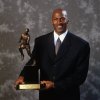The NBA crowns its Most Valuable Player at the end of each season. Which of these players, though, have been on the most valuable contract?
We researched each MVP winner since 1990-91 and then calculated what percentage of the total salary cap their earnings accounted for relative to the team’s total cap.
1. Derrick Rose, 2011: 9.56 percent

(Photo by Nathaniel S. Butler/NBAE via Getty Images)
Salary: $5,546,160
Salary Cap: $58,044,000
The cheapest MVP relative to the NBA salary cap in league history is none other than Derrick Rose. He went from Rookie of the Year in his first season to Eastern Conference All-Star as a sophomore and then MVP the following year. His salary relative-to-performance was noticeably disproportionate. Fortunately for the star point guard, he was the first to benefit from the 5th Year 30% Max Criteria – which is why it is now better known as the Derrick Rose Rule. This helped him earn a much larger share of the cap on his second deal. Unfortunately, this was met with injuries so impactful that the guard has still not yet averaged 20.0 points per game since 2012.
2. Stephen Curry, 2016: 16.24 percent

(Photo by Ezra Shaw/Getty Images)
Salary: $11,370,786
Salary Cap: $70,000,000
By the time Golden State Warriors superstar Stephen Curry won his second MVP, he was collecting a smaller paycheck than 64 other players in the league. For context, the players ranked in the same spot for the upcoming season are Julius Randle and Myles Turner. This helped the Warriors finish with the best regular-season win-loss record of all-time while still having the cap space to sign Kevin Durant the following offseason, as he was still on a cheaper deal when the cap jumped an additional $24.14 million.
3. Michael Jordan, 1996: 16.74 percent

(Photo by Andrew D. Bernstein/NBAE via Getty Images)
Salary: $3,850,000
Salary Cap: $23,000,000
NBA icon Michael Jordan is a five-time MVP, winning the award three times during his first contract. He signed his second deal in September 1988, which was worth $25.7 million over eight seasons. While the guaranteed deal was lucrative, the salary cap spiked ($15.9 million in 1994 to $23.0 million in 1995) following an anti-trust lawsuit. While the agreement from the lawsuit resulted in no strike, Jordan’s deal suddenly became one far more beneficial to the franchise. It was rectified, however, when Jordan signed two back-to-back one-year deals, each worth over $30 million per season for 1996-97 and 1997-98.
4. Stephen Curry, 2015: 16.85 percent

(Photo by Andrew D. Bernstein/NBAE via Getty Images)
Salary: $10,629,213
Salary Cap: $63,065,000
When the Warriors signed Curry to a four-year extension after his rookie deal expired in October 2012, he was suffering from nagging injuries and was not yet the impactful superstar that he is today. This helped Golden State secure his rights on an extraordinarily valuable contract, which became especially clear to the league during the first season he won MVP in just his second stint as an All-Star. This was a wakeup call to the rest of the league that a dynasty was about to begin for the Warriors.
5. Charles Barkley, 1993: 17.29 percent

(Photo by Andrew D. Bernstein/NBAE via Getty Images)
Salary: $2,420,000
Salary Cap: $14,000,000
After spending his first eight seasons with the Philadelphia 76ers, Charles Barkley was traded to the Phoenix Suns during the 1992 offseason. He then signed a contract extension with the Suns, but it paid less average annual value during the first few seasons than what he was paid by during each of his final two seasons with the Sixers. Yet the forward won the MVP in his first campaign with Phoenix, averaging 25.6 points and 12.2 rebounds per game.
6. Karl Malone, 1997: 19.12 percent

(Photo by Andy Hayt/NBAE via Getty Images)
Salary: $4,657,000
Salary Cap: $24,363,000
Fourteen-time All-Star Karl Malone agreed to a contract extension with the Utah Jazz in January 1996. The following season, he won the first of his two MVP awards. He led the Jazz to their most-ever regular-season wins (64) in franchise history. Utah also won the Western Conference xhampionship over the Houston Rockets, who had defeated the Jazz the previous two years in the playoffs.
7. Steve Nash, 2006: 19.44 percent

(Photo by Lisa Blumenfeld/Getty Images)
Salary: $9,625,000
Salary Cap: $49,500,000
Although he was originally drafted by the Suns, Steve Nash played just two years with the organization before he was traded to the Dallas Mavericks. He then spent six years with the Mavericks, though he won back-to-back MVPs after returning to Phoenix. Nash led the league in total assists and assists per game in each of his first three years back with the franchise.
8. Steve Nash, 2005: 19.95 percent

(Photo by Barry Gossage/NBAE via Getty Images)
Salary: $8,750,000
Salary Cap: $43,870,000
Nash returned to to the team that drafted him, signing a five-year deal worth $65.6 million with the Phoenix Suns back in July 2004. The timing was poor, however, as the cap spiked significantly the following season. The cap was based on just 48.05 percent of all basketball-related income (BRI) from the collective bargaining agreement (CBA) in 1999. But that increased to 49.50 percent with the CBA in 2005, indicating Nash would have been better off to sign his contract when the CBA was rectified rather than have his deal locked in beforehand.
9. Karl Malone, 1999: 20.47 percent

(GEORGE FREY/AFP/Getty Images)
Salary: $6,142,000
Salary Cap: $30,000,000
The 1995 CBA allowed the NBA to opt-out of the deal if player salaries were more than 51.8 percent of projected revenues. Once these figures reached 58 percent, the league canceled the beginning of the 1998-99 campaign as well as the 1999 NBA All-Star Game. The resolution included the introduction of max salaries and the start of the luxury tax system. Malone won MVP during the shortened, 50-game season and was only able to became a free agent the following offseason.
10. Hakeem Olajuwon, 1994: 20.89 percent

(Photo by Andrew D. Bernstein/NBAE via Getty Images)
Salary: $3,170,000
Salary Cap: $15,175,000
The Houston Rockets drafted Hakeem Olajuwon in 1984 and he was able to play 17 years for the organization. The center signed his first contract extension in 1988, though requested a trade during the offseason in 1992 as he felt he was underpaid as one of the top stars in the game. The Rockets did not trade him, instead deciding to hire a new coach. He received a four-year contract extension in 1993, then winning his only MVP award in 1994.













